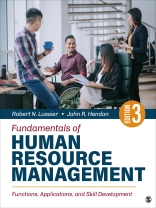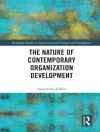Fundamentals of Human Resource Management: Functions, Applications, and Skill Development, Third Edition helps students of all majors build the skills they need to recruit, select, train, and develop people. Bestselling authors Robert N. Lussier and John R. Hendon explore the important strategic function HR plays in today′s organizations. A wide variety of applications, online self-assessments, and experiential exercises keep students engaged and help them see the relevancy of HR as they learn skills they can use in their personal and professional lives. The Third Edition includes 13 new case studies and new coverage of virtual and flexible work resulting from the COVID-19 pandemic, the long-lasting effects the pandemic has had on women in the workforce, artificial intelligence use within HR, and diversity and inclusion.
Tabela de Conteúdo
Preface
Acknowledgments
About the Author
Part I: The Human Resource Management Environment
Chapter 1: Today’s Human Resource Management
Why You Should Study Human Resource Management (HRM)
HRM Past and Present
HRM Skills
HRM Responsibilities
Resources for HRM Careers
Practitioner′s Model for HRM
Trends and Issues in HRM
Chapter 2: Strategic and Inclusive Human Resource Management
An Introduction to Strategic Planning and the Environment
Strategy
Generic Strategies and HRM
Diversity and Inclusion
Managing Diversity and Inclusion
The HR Technology Revolution
Human Resource Management Systems (HRMS)
Measurement Tools for Strategic HRM
Trends and Issues in HRM
Chapter 3: The Legal Environment
A User’s Guide to Managing People Fairly
Major Employment Laws
Affirmative Action, Equal Employment Opportunity, and the EEOC
Sexual Harassment
Religious Discrimination
Trends and Issues in HRM
Part II: Staffing
Chapter 4: Workforce Planning: Job Analysis, Design, and Employment Forecasting
Workforce Planning and Workflow Analysis
Job Analysis
Job Design/Redesign
Designing Jobs
Increase Motivation Using the Job Characteristics Model (JCM)
HR Forecasting
Forecasting Methods
Reconciling Labor Supply and Demand
Trends and Issues in HRM
Chapter 5: Recruiting Job Candidates
Factors Affecting the Recruiting Process
Organizational Recruiting Considerations
Internal or External Recruiting?
Challenges and Constraints in Recruiting
Evaluation of Recruiting Programs
Trends and Issues in HRM
Chapter 6: Selecting New Employees
The Selection Process
Looking for “Fit”
Uniform Guidelines on Employee Selection Procedures
Applications and Preliminary Screening
Testing and Legal Issues
Selection Interviews
Background Checks
Selecting the Candidate and Offering the Job
Trends and Issues in HRM
Part III: Developing and Managing
Chapter 7: Training, Learning, Talent Management, and Development
The Need for Training and Development
The Training Process
Learning and Shaping Behavior
Design and Delivery of Training
Assessing Training
Talent Management and Development
Trends and Issues in HRM
Chapter 8 Performance Management and Appraisal
Performance Management Systems
The Performance Appraisal Process
Why Conduct Performance Appraisals?
What Do We Assess?
How Do We Use Appraisal Methods and Forms?
Who Should Assess Performance?
Performance Appraisal Problems
Debriefing the Appraisal
Trends and Issues in HRM
Chapter 9 Employee Rights and Labor Relations
Managing and Leading Your Workforce
Job Satisfaction
Commonly Accepted Employee Rights
Management Rights
Coaching, Counseling, and Discipline
Legal Issues in Labor Relations
Unions and Labor Rights
Trends and Issues in HRM
Part IV: Compensating
Chapter 10: Compensation Management
Compensation Management
Motivation and Compensation Planning
Compensation Strategy
Legal and Fairness Issues in Compensation
Job Evaluation
Developing a Pay System
Pay Structure
Trends and Issues in HRM
Chapter 11: Employee Incentives and Benefits
The Strategic Value of Incentives and Benefits
Variable Pay
Group Incentives
Executive Compensation
Statutory Benefits
Statutory Requirements When Providing Certain Voluntary Benefits
Voluntary Benefits
Flexible Benefit (Cafeteria) Plans
Trends and Issues in HRM
Part V: Protecting and Expanding Organizational Outreach
Chapter 12: Workplace Safety, Health, and Security
Workplace Safety and OSHA
The Occupational Safety and Health Administration (OSHA)
Employee Health
Stress
Workplace Security and Violence
Trends and Issues in HRM
Chapter 13: Ethics, Corporate Social Responsibility, and Sustainability
Is It Ethical?
Ethical Organizations
Ethical Questions for Managers
Corporate Social Responsibility (CSR)
Sustainability
Trends and Issues in HRM
Chapter 14: Global Issues for Human Resource Managers
Globalization of Business and Human Resource Management
Legal, Ethical, and Cultural Issues
Global Staffing
Developing and Managing Global Human Resources
Compensating Your Global Workforce
Trends and Issues in HRM
Glossary
Notes
Company Index
Subject Index
Sobre o autor
John R. Hendon is a seven-time entrepreneur and former director of operations for a $60 million company. He brought his experience and interests to the classroom full time in 1994 and has been a Management faculty member at the University of Arkansas at Little Rock for over 17 years. An active member of the Society for Human Resource Management, he teaches in the areas of Human Resources Management, Strategy, and Organizational Management, and researches in a number of areas in the Management field, specializing in Entrepreneurial research. John is also currently the President of “The VMP Group, ” an Arkansas-based business consulting firm. John’s company consults with a variety of businesses on human resources, family business, strategic planning, organizational design, and leadership. He has provided professional assistance in the start-up and operation of dozens of Arkansas and California-based businesses and non-profits, government agencies, and utilities. John holds an MBA degree from San Diego State University and a BS in Education from the University of Central Arkansas.












